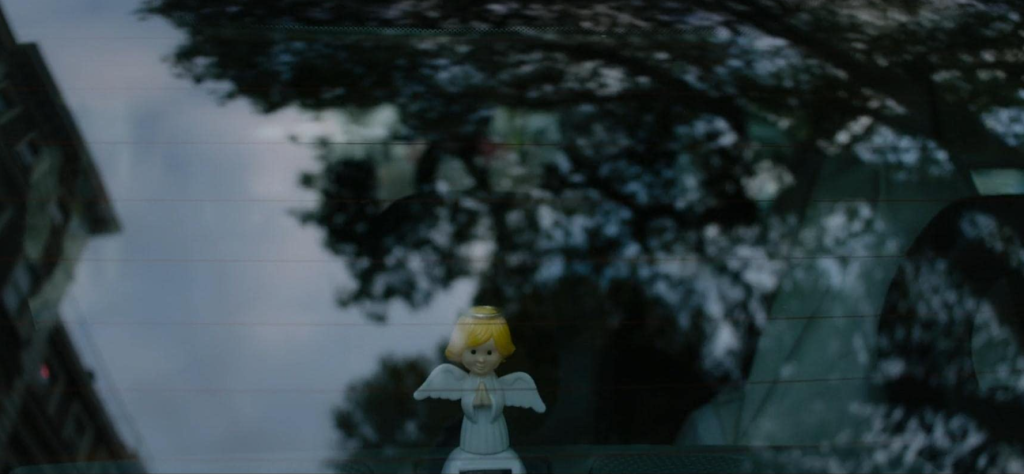Jena Malone’s intriguing theme of critique of religion in film
How do these three films tackle religion and the surrounding culture, and why did Jena Malone star in all of them?
Religion is a subject that is often discussed, critiqued or praised in films; it just depends where you look. Many films opt to critique it, which tends to yield an intriguing and thoughtful movie. Interestingly enough, actress Jena Malone has starred in three films that do so. Jena Malone is an underrated indie actress, though she is known for some larger films like “Donnie Darko” and “The Hunger Games: Catching Fire,” along with its subsequent sequels. Malone’s filmography stretches from her childhood in 1996 to the present; she has managed to snag a mixture of blockbusters and smaller, more off-beat films.
Malone’s three films that are relevant to religion are “The Dangerous Lives of Altar Boys” in 2002, “Saved!” in 2004, and “Consecration” in 2023. They are all fairly distinct films in their own right, but all focus on religion and the harm that the church (as an organization) can cause. This article explores how religion is depicted in these three films, so spoilers await anyone who chooses to read further.
In February of 2023, Malone stated in an interview with Deirdre Crimmins for the publication Rue Morgue:
“I had a sort of non-denominational Christian-ish upbringing, but with lesbian parents,” and that she had always been interested in things that were mysterious to her as a child— religion being one of those mysteries.
“The Dangerous Lives of Altar Boys” is an indie comedy-drama starring Emile Hirsch, Keiran Culkin and Jodie Foster, with Malone as a secondary character. Her character is plagued by guilt because her brother molested her, something she thinks is a sin because of the religion she was raised in. The altar boys also struggle with this relationship to religion, and find themselves coming of age with a confusing religious backdrop, but Malone’s character is where religion is really explored. She blames herself for what happened to her, and fears she is going to hell because of it. The film is a clear critique on this type of culture that can perpetuate harm to children and young adults, though it does not condemn nor demonize religion.
Malone explained in an interview with Bill Chambers for Film Freak Central in 2002, “[…] it’s such a beautiful depiction of what it’s like to be young.”
That is really what the film aims to portray, with the added flavor of religious criticism thrown in. Religious guilt is a serious topic addressed, but it’s most prominent with Malone’s character, and less of a concern with the male leads who prefer to steal a statue of St. Agatha and laugh about it instead.
“Saved!” is a lead role for Malone, where she stars alongside Mandy Moore, Eva Amurri, and funnily enough, Macaulay Culkin (among others). “Saved!” is a clear-cut comedy. It satirizes religion with Moore’s character who is wholly devoted to Jesus. Malone’s character finds herself pregnant after sleeping with her gay boyfriend in an attempt to turn him straight, all influenced by her proximity to Christianity. Throughout the movie, Malone’s character becomes disillusioned with religion and finds herself a supportive group of outcasts who are quite the opposite of the religious fanatics Malone’s character is used to. The film is a direct criticism of religion, though it does so in a humorous way. It shows how misinformation based on religion can be confusing and ultimately damaging not only to teens, but to everyone.
About the film, Malone was quoted in 2004 by Rob Blackwelder for SPLICEDwire, saying, “Belief is such a powerful thing. But because it is, it can also be very destructive and it’s very easily manipulated.”
“Consecration” is far different from the other two films, and admittedly is an odd choice to include in the same breath as them. It is a horror film, and does not critique religion, but rather the Catholic church as an entity.
In regard to her interest in the film, Malone explained in her interview in Rue Morgue, “I think the beauty of Catholicism that really sets it apart from a lot of other religions is the austerity of its rituals. How much it’s open about how much it keeps behind closed doors. It’s very upfront about that.”
The film takes an almost fantasy-based approach to Catholicism. The film is mythological, mysterious and very moody. The story itself focuses on Malone’s character learning she has supernatural powers associated with religion, ones that the church fears. The film’s message is a positive one about her powers, likening her to a guardian angel, but it certainly villainizes the nuns and the priest who attempt to contain her. The film highlights hypocrisy in Catholicism, and doesn’t shy away from dark subject matter.
In the aforementioned interview director Christopher Smith explained, “Ultimately, it’s about guilt.”
It seems a lot of religious themes can be boiled down to guilt or fear, and though “Consecration” is a far cry from “Saved!” and “The Dangerous Lives of Altar Boys,” all of them share these undertones. Whether Malone is pregnant due to a well-meaning mistake and poor education thanks to Christianity, feeling guilt because of her brother’s actions or taking on a nearly angelic role, the guilt and the fear remain— in different amounts, of course. The films all offer differing perspectives on religion and are all valuable in their own right.



